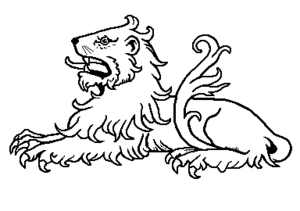Lion: Difference between revisions
From Cunnan
Jump to navigationJump to search
m (links) |
|||
| (One intermediate revision by one other user not shown) | |||
| Line 7: | Line 7: | ||
==People Associated with Lions== |
==People Associated with Lions== |
||
The '''lion''' is used as the [[Christian]] [[12th century symbolism|symbol]] for the |
The '''lion''' is used as the [[Christian]] [[12th century symbolism|symbol]] for Mark, one of the four Evangelists. For this reason, it often appears in [[church]] [[manuscript]]s in the [[illumination]]. |
||
[[Richard I]]'s ferocious military prowess earned him the epithet ''Coeur de Lion'' (Lion Heart). |
[[Richard I]]'s ferocious military prowess earned him the epithet ''Coeur de Lion'' (Lion Heart). |
||
| Line 14: | Line 14: | ||
*[[Lion (Maplet)|Lion according to Maplet's ''A Greene Forest'']] |
*[[Lion (Maplet)|Lion according to Maplet's ''A Greene Forest'']] |
||
[[category:device heraldry]] |
|||
Latest revision as of 17:42, 22 August 2008

A lion couchant
The lion is a large feline animal, native to Africa.
Heraldic Lions
The lion is a common heraldic charge. It is often associated with the royal arms of England. An English lion is lion passant gardant. However it can be confused with a leopard that was never used in heraldry with spots.
People Associated with Lions
The lion is used as the Christian symbol for Mark, one of the four Evangelists. For this reason, it often appears in church manuscripts in the illumination.
Richard I's ferocious military prowess earned him the epithet Coeur de Lion (Lion Heart).